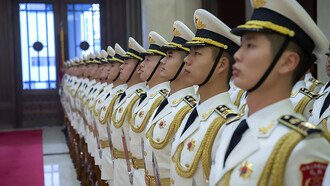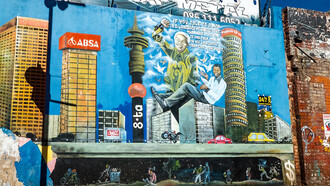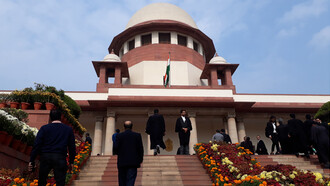Javier Milei was elected president in October 2023, and many things have changed in Argentina in the months since his inauguration. Milei's administration challenges many aspects of Argentinian’s lives, most immediately, like inflation and the rising cost of living. But I’m interested in focusing on another issue, perhaps less urgent but highly relevant to our democracy: the impact of this new right-wing discourse on a very specific area—the representations surrounding Argentina's past of political violence.
It’s important to clarify that in Argentina, speaking about human rights is often interpreted as synonymous with the crimes committed during the last dictatorship. This understanding is ingrained in common sense, and much work remains to be done in raising awareness that human rights are much broader and more complex. But It seems that is not a worry for this government.
Javier Milei chose Victoria Villarruel as his running mate, a lawyer linked to the armed forces. Through the Civil Association for Legal Studies on Terrorism and its Victims, which she founded and leads, she promotes the oxymoron of the "complete truth." I say oxymoron because truth is always fragmentary and incomplete.
Almost a year into the government, Villarruel is better known for her statements than for her actions. For example, on August 21st, she led an event in the Senate for the International Day of Remembrance and Tribute to the Victims of Terrorism. She was accompanied by relatives of victims of the guerrilla’s armed actions in the 1970s and the AMIA attack victims, the Jewish association that suffered a bombing on July 18th, 1994, which remains unsolved. There, the vice president announced the reopening of cases against militants of the revolutionary left.
It’s unclear how she intends to do this, as these cases have already expired under Argentine law. Quickly, Milei’s inner circle distanced itself from this announcement, clarifying that it is not on the president's agenda. Villarruel omits the fact that Raúl Alfonsín, the president elected after the dictatorship's fall, initiated trials against both the military and guerrilla leaders. It’s also ironic that the one who issued pardons for repressors and guerrilla members was Carlos Menem, whom Milei has called “the best president in history.”
Emilio Crenzel, sociologist and professor at the University of Buenos Aires and author of The Political History of Nunca Más, is one of the most respected researchers in the field of collective memory. Asked for this article, he pointed out that Milei's position regarding the dictatorship is not significant for his electorate nor crucial to maintaining his popularity. His electoral victory is more due to widespread disillusionment with previous governments and the severe economic decline post-pandemic. Some conservative sectors may have voted for him, but they do not represent a large electoral base.
Since 2004, with Néstor Kirchner’s presidency, human rights organisations representing the families of the disappeared took a prominent place as government allies. Cristina and Néstor Kirchner publicly presented themselves as Peronist militants linked to the left in the 1970s, prominently including opposition to the dictatorship in their rhetoric and positioning themselves as comrades of the disappeared.
In line with this, they took actions such as reopening trials for repressors, evicting the Naval Mechanics School to turn it into a memorial space, and establishing March 24th (the anniversary of the 1976 coup) as a national holiday. This built a memory that Todorov would call “literal,” which entails serious risks.
During Mauricio Macri’s presidency (2015–2019), organisations like the Mothers and Grandmothers of Plaza de Mayo positioned themselves as opposition, but there were no significant changes. This was even more true under Alberto Fernández's allied government (2019–2023). With the arrival of the current government, there is concern that those who support dictatorship-sympathetic narratives are now in power. However, so far, there have been no concrete actions translating into policies.
There have only been statements and gestures that irritate and make headlines but do not go further. Thus, I wonder how possible it is to challenge the official narrative about the dictatorship that has been constructed in recent years. There seems to be no room for debate—only entrenched positions, with no space for questioning or doubt.
At the August event, Villarruel said: “That we are honoring the victims of terrorism seemed impossible in a country where the State extolled, glorified, and elevated the atrocious crimes of terrorism. It seemed utopian that there could be any light, any truth, amidst the pestilent darkness constructed by Kirchnerism over the most painful decade of our history.” The aim here is not to equate the responsibility of an armed group with the crimes committed by the national government, but why can’t the people killed by leftist political-military organisations also be thought of as victims? Such questions are quickly censored by public opinion for not aligning with what, until a year ago, was the official memory of the military dictatorship.
Following this event, Estela de Carlotto, president of the Grandmothers of Plaza de Mayo, was interviewed by a radio station, where she stated, "If they could kill us, they would. Not just those who survived, but the families, too, because they have a tremendous hatred for me, and I didn’t do anything to them.” It’s an exaggerated reaction, but this is the level of discussion.
Two aspects of the past are very difficult to discuss in Argentina, and the vice president has chosen to address both. I’m referring to the guerrilla attacks and the issue of the Falklands. On this topic, in September, Foreign Minister Diana Mondino agreed with her British counterpart to resume weekly flights to the islands with a stopover in Córdoba (which had been discontinued since 2018) and announced a new trip for families to the Argentine cemetery. Villarruel stated, "The proposed agreement with the United Kingdom is contrary to our Nation's interests. It proposes providing logistical support for the occupation and effectively allowing them to continue plundering our seas. For what? So we can visit our islands with a visa and passport?"
Months ago, a group of depuities from La Libertad Avanza, Milei’s party, visited detained repressors in prison. One of them was Alfredo Astiz, a symbol of the repression. The reason for the visit was never clarified, and the scandal it caused (especially within the ruling party’s legislative bloc, resulting in a deputy’s expulsion) has already faded from memory, reflecting the harshness of the media agenda. Milei once again distanced himself from the events, claiming that the organiser of the meeting is a priest who hates him and that the whole thing may have been pushed by the vice president.
Questioning the number of disappeared people or appealing to narratives like the “war theory” is nothing new. Nor is it new for the president and vice president to distance themselves from each other. Milei and Villarruel had already begun to diverge during the election campaign when it was confirmed in the final stretch that the Defense and Security ministries would not be under Villarruel’s control but given to Patricia Bullrich in exchange for her support to win the election.
In the first round of the presidential debate in October 2023, Javier Milei said, “We are against a one-sided version of history. For us, during the '70s, there was a war, and the armed forces committed excesses, and because they had the monopoly on violence, they should bear the full weight of the law, but the Montoneros and the People’s Revolutionary Army terrorists also committed crimes against humanity.” He then added that his government would focus on Argentina’s future, not rewriting its history, and that his rivals could continue wasting time on that debate. As his administration nears its first anniversary, he seems to have kept his promise.















